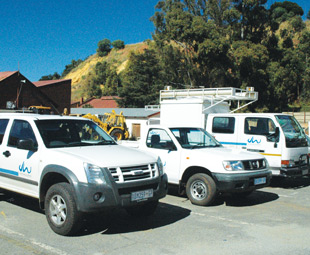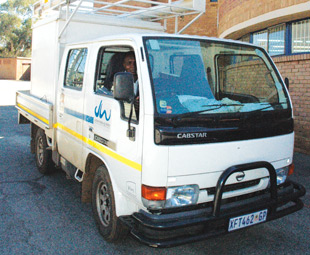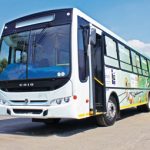Testing the waters

If you live or work in the city of Johannesburg, you’re sure to to have noticed Johannesburg Water vehicles buzzing around. FOCUS chats to the municipal utility about meeting public expectations.
Municipal utilities are expected to adhere to strict procedures and standards – the public relies on their services, with few or no alternatives if things go wrong. Which is why Johannesburg Water, servicing the “City of Gold”, must continuously strive to be as reliable as possible, no matter what obstacles it faces.
And obstacles there are! Johannesburg might be South Africa’s biggest metropolis, but it spans urban cityscapes to rural, unpaved townships. And thanks to heavy traffic and potholes so big and deep they pose a serious threat even to a truck’s suspension, urban areas are often difficult to navigate.
To ensure the reliable provision one of mankind’s most essential requirements, water, Johannesburg Water’s fleet needs to be reliable and on the road. This means having the right vehicles for the right job, as well as a service and maintenance system that minimises downtime.
Choosing a fleet
Although Johannesburg Water outsources its fleet management to FleetAfrica, a division of Super Group Limited, the municipal utility understands its operational area and the service it provides. So it is intimately involved in choosing the right vehicles for its fleet and knows how many are required to service the greater Johannesburg area.
According to Tilda Mbongo, fleet manager, Johannesburg Water, the municipal utility’s fleet currently comprises 693 vehicles: a mix of passenger vehicles, one-ton pick-ups, and medium commercial vehicles of up to four tons. Each vehicle is carefully chosen according to the specific task it needs to perform. “Our relationship with FleetAfrica is based on the fact that we are each experts in our own fields,” explains Mbongo. “We understand the service we deliver, and the tools and vehicles we need to achieve our aims and adhere to government mandates and regulations; FleetAfrica provides the fleet maintenance expertise. When we need new vehicles we will always discuss our requirements with them – and together we will make a choice that suits us both.”
“We have six radians within the City of Johannesburg, and about 26 depots,” adds Mandla Hlatshwayo, fleet coordinator for Johannesburg Water. “These depots don’t service the same areas, nor do the vehicles always travel in the same conditions. Some depots need vehicles with high ground clearance, others need bigger load space because they service more areas in one day.” It is information like this that Johannesburg Water brings to the table, with FleetAfrica contributing expert knowledge of manufacturers, service packages and approved service and maintenance facilities.
“Although FleetAfrica owns our vehicles, we operate them from our municipal depots,” explains Mbongo. “As fleet managers, FleetAfrica advises us where to take the vehicles for services and maintenance, which is part of our contract with them. On our side, we ensure that our drivers look after their assets.”
When a vehicle reaches either five years in operation or 120 000 km, Johannesburg Water returns it to FleetAfrica, who put the vehicle on the market. “There are risks associated with owning a fleet,” she explains. “Through outsourcing this non-core function, we have passed on those risks to professionals.”
According to FleetAfrica, one of the benefits of using an outsourced fleet solution is that the provider can customise the fleet to individual business requirements. This means paying close attention to Johannesburg Water’s needs, while bringing along its own expertise in fuel management, insurance, licensing, reporting and fleet consulting.
For example, although Johannesburg Water does take ownership of its staff, including its drivers, FleetAfrica’s vehicle and driver monitoring and reporting system is vital in assisting the utility in training and retraining its drivers when necessary.
 “We cannot ignore whether our drivers are competent or not,” adds Mbongo. “Our agreement with FleetAfrica includes looking after the vehicle, which doesn’t only mean avoiding accidents; it entails treating the gearbox and engine with care and respect, so that the vehicle maintains its value.
“We cannot ignore whether our drivers are competent or not,” adds Mbongo. “Our agreement with FleetAfrica includes looking after the vehicle, which doesn’t only mean avoiding accidents; it entails treating the gearbox and engine with care and respect, so that the vehicle maintains its value.
“Ensuring that our drivers are competent gives Johannesburg Water a good name on the roads as well. As a government utility, it’s important that we adhere to national, provincial and municipal regulations.”
These include a strong emphasis on getting drivers ready for the new demerit point system – or the Administrative Adjudication of Road Traffic Offences Act (Aarto) – and preparations for a new law coming into effect that says equipment and passengers may no longer share space in a vehicle.
“Aarto is particularly important,” says Mbongo. “Besides the fact that we cannot have drivers losing their licenses or vehicles being removed from the road, as a municipal body we need to be leaders in new regulation compliance. It’s therefore vital that our drivers understand the system and are able to adhere to all road rules through good training and an instilled culture of compliance.”
As far as the second law is concerned, Nissan Commercial Vehicles and Isuzu Truck South Africa have pre-empted the problem in the form of the CabStar double cab and the N-Series CrewCab respectively.
Trucks with a difference
The Cabstar and the CrewCab offer operators something no other medium commercial vehicles (MCVs) have done before: the load space of an MCV, with the double cab seating capabilities of a double cab pick-up truck.
Both models can seat five passengers comfortably, while keeping people completely separate from the load of equipment. “These vehicles are ideal for municipal applications, where equipment needs to be transported along with a team of between three and five people,” says Isuzu Truck SA’s product planning and engineering manager, Anton du Plessis. “With the CrewCab, gone are the days of the team needing to sit in the back of a vehicle with the equipment.”
Not only does utilising Cabstars and CrewCabs mean a much safer journey for municipal employees, but it is pre-emptive of upcoming legislation. “We chose these vehicles because they suit our needs perfectly,” confirms Mbongo. “Through our contract with FleetAfrica, we requested the purchase of these specific vehicles for our fleets and we have been extremely satisfied with them.”
In fact, the entire system works well for Johannesburg Water, who made the decision a few years ago to outsource all non-core activities, thereby focusing on what a city water utility should be doing, rather than trying to manage peripheral activities as well. FleetAfrica protects Johannesburg Water from unplanned cost escalations, fuel fraud, excessive maintenance costs and disposal risk, while ensuring a well-looked-after fleet that is always on the road.
Published by
Focus on Transport
focusmagsa



